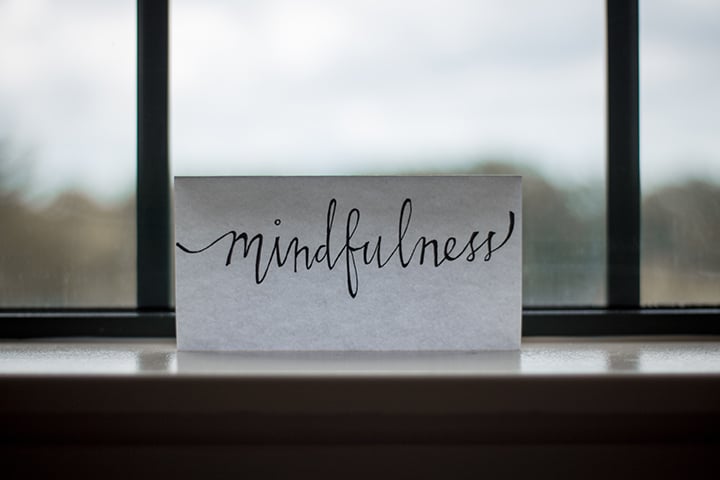
Today’s society sets high expectations for everyone, especially young people. You’re expected to learn everything on your own, be the best at what you do and be an unfailing support system to those around you — all while achieving traditional milestones like homeownership and parenthood.
These expectations create the perfect environment for stress and anxiety to build up without you even noticing until you’re overwhelmed. An easy solution to redirecting your life in a healthier direction is to practice mindfulness.
Those who haven’t tried mindfulness before may confuse it with meditation, which is the art of disconnecting from negative thoughts or feelings. Instead, mindfulness teaches you to focus and be present in the moment so that you can observe your emotions from a fresh perspective.
Through mindfulness, people often gain a more positive outlook on life and a better sense of self. Read on to learn some easy ways you can make mindfulness a part of your everyday life, no matter what your daily routine looks like.
Quick Navigation
- Wake With Your Circadian Rhythm
- Try Spiritual or Physical Routines
- Write Down Your Thoughts
- Accept Potential Imperfections
- Take Deep Breaths
- Take Time To Stretch
- Practice Lunchtime Breathing
- Listen With Mindful Intent
- Write What You’re Thankful For
- Repeat Your Mantra
- Pause Before Class
- Check In With Yourself
- Slow Yourself Down
- Pause Before Leaving
- Listen And Collaborate
Relationship Mindfulness Techniques
- Consult Peace In Conflict
- Take Mindful Responsibility
- Visualize Your Growth
- Choose To Let Go
- Unplug For The Evening
- Think Before You Speak
- Reassess Your Anxiety
- Strengthen Your Emotional Intelligence
- Listen to Your Body
- Watch Your Body Language
Morning Mindfulness Tips
Whether you’re a morning person or not, moving through the motions of a morning routine is what gets your day started on a positive or negative note. Try these morning mindfulness tips to lay a solid foundation for whatever you have going on during the day.
1. Wake With Your Circadian Rhythm
If you’re not in tune with how much sleep your body needs, you won’t be able to have a productive morning when you wake up. Instead, take a few nights to adjust your sleeping habits and fall in line with your circadian rhythm. Waking up when your body is ready will take your morning routine to the next level.
2. Try Spiritual or Physical Routines
If you feel like your morning is still lacking something, incorporate some spiritual or physical routines. A morning walk or time set aside for prayer may center you more effectively than journaling or breathing, depending on your beliefs or personality.
3. Write Down Your Thoughts
Some people struggle with anxiety first thing in the morning. In those moments when all you can think about are the things you need to do, pause and write down what you’re thinking. You’ll channel all your negative energy into your journal and walk away with less anxiety weighing you down. Journaling also makes you more present, which is one of the most significant benefits of mindfulness.
4. Accept Potential Imperfections
Sometimes it’s hard to stay mindful of the present because your thoughts focus on how things might go wrong later in the day. Each morning, walk yourself through the process of accepting potential imperfections that might come up throughout the day. Mistakes aren’t a reflection of your value, and they won’t keep you from achieving your goals.
5. Take Deep Breaths
A groggy mind can be hard to manage in the morning, but taking deep breaths will help. Even if it’s just for one minute, practice sitting up straight and breathing from your diaphragm. You’ll circulate more oxygen to your brain and be naturally energized when you finish your breathing routine.
Mindful Work Routines
It’s all too easy to lose yourself in a busy day at work. Try these mindful work routines to stay more present while you complete your daily tasks.
6. Take Time to Stretch
Have you ever sat back from your computer screen and realized your muscles felt tight? That happens when you aren’t listening to what your body needs during work. Take time to stretch for a few minutes each day so that you aren’t cramped at your desk, thus decreasing your stress.
7. Practice Lunchtime Breathing
Before or after you eat your lunch, practice the same deep breathing routine you tried in the morning. You’ll bring your heart rate back down, digest your food better and go back into work feeling more centered.
8. Listen With Mindful Intent
Don’t let yourself zone out while a coworker talks with you about their weekend or presents during a meeting. Instead, listen with mindful intent. Put all your energy into listening to what they say and hearing what they mean at that moment.
9. Write What You’re Thankful For
One of the easiest ways to bring your mind back to the present is to consider what you’re thankful for. Write down your thankful thoughts — like what you were grateful for that morning or what you’re glad will happen later that day.
10. Repeat Your Mantra
What encouragement would you like to hear during your day? Pick a mantra and write it down where you’ll see it, then repeat it when you feel yourself becoming less present.
Mindfulness In Education
Students work a full-time job just by attending classes. High school and college courses take up a ton of time and energy, but you can still be mindful while you work towards good grades.
11. Pause Before Class
Get in the habit of arriving to class a few minutes early. After you lay out everything you need, you can pause to be mindful of why you’re there and what you want from that class period. When class begins, you’ll be in the right headspace to focus and get more out of the lesson.
12. Check in With Yourself
While your lecture flies by, check in with yourself and see where your attention is. Has your mind wandered off into a daydream, or are you absorbing what your instructor is saying? A quick check-in brings you back to the present when you normally wouldn’t even realize your mind had wandered.
13. Slow Yourself Down
It’s tempting to let yourself rush through tests and quizzes because you’re stressed, but slowing yourself down is an easy mindfulness technique. Weigh each question individually and only answer after taking a deep breath for more enhanced focus and memory recall.
14. Pause Before Leaving
If you have time, take a minute to finish each class with a thoughtful pause. Review what you’ve learned or accomplished. The information will stick in your memory better with a 60-second review and reflection.
15. Listen and Collaborate
Nearly every student groans internally when their teacher assigns a group project, but these assignments are perfect opportunities to practice mindfulness. As your group members review their plans for the project, put your energy into listening and collaborating instead of just responding to the words others say.
Relationship Mindfulness Techniques
Finding inner peace and acceptance is important in all walks of life, but especially in your relationship with your partner. These mindfulness techniques will transform the dynamic you both share and make your relationship more present in each moment.
16. Consult Peace in Conflict
Fights happen in every relationship, no matter how much you love each other. During moments of conflict, consult with yourself to find the peace necessary to end the fight. It will remind you why you’re there and what you love about your partner.
17. Take Mindful Responsibility
When you’re at fault in an argument with your partner, practice taking mindful responsibility. Accept you’re at fault, admit what you’ve done and learn from it. By taking the time to learn from your mistakes, you’ll be less likely to repeat the fight in the future.
18. Visualize Your Growth
Two people in love grow together — whether they’re thinking about it or not. Each day, take a moment to visualize the growth you and your partner have experienced. Your personal growth and your relationship’s transformation will humble you and center you with a grateful spirit.
19. Choose to Let Go
It’s easy for people to subconsciously keep a list of mistakes their partner has made, but mindful people choose to let go of that list. Having part of your heart living in the past is unhealthy. Live in the present by letting go of mistakes that don’t carry significant weight.
20. Unplug for the Evening
Watching a show or movie together can be a fun way to spend time together, but it shouldn’t consume your relationship. Couples typically spend a third of their time in front of a screen, which keeps them from enjoying being together in that moment. Choose to unplug for the evening after you and your partner get home or meet up, and instead spend your time in quality conversations.
Mindful Social Habits
Social settings can be busy, stressful and fun at the same time. Don’t let your mindfulness slip away — instead, practice these techniques while you’re out with friends.
21. Think Before You Speak
“Think before you speak” is a phrase you’ve probably heard many times before. It’s also the perfect mindfulness trick to use in social settings. Thinking more carefully and actively about what you say makes you more present and attentive to your conversations.
22. Reassess Your Anxiety
People with anxiety know the feeling of being out with friends while managing rising social anxiety. Make a mindful effort to pause occasionally while you’re being social, and reflect on your anxiety levels. Step away to a private bathroom stall or outside patio to breath through your anxiety and bring yourself back to the more enjoyable present.
23. Strengthen Your Emotional Intelligence
You may lose yourself in stressful social environments due to a weakened sense of emotional intelligence. Emotional intelligence is the act of strengthening emotional responses like empathy and understanding so that you relate better to the people around you. Be mindful of this emotional intelligence to better understand your social strengths and weaknesses.
24. Listen to Your Body
Mindfulness is an act of self-care — which also includes listening to your body in social environments. Monitor your stress and anxiety, as well as your hunger and energy levels. Being mindful of your body’s needs will make you a stronger individual, both mentally and physically.
25. Watch Your Body Language
How you appear to other people speaks louder than what you say. Watch for negative body language in how you hold yourself. Sitting straight and maintaining eye contact are mindfulness efforts that will make you more engaged and energized.
Test These Mindfulness Tips
The only way to know which mindfulness techniques are right for you is to test them out. Some may be more effective for you than others, which is normal. Once you find the tips that work best for you, you’ll develop a healthy, mindful routine you can use every day.




